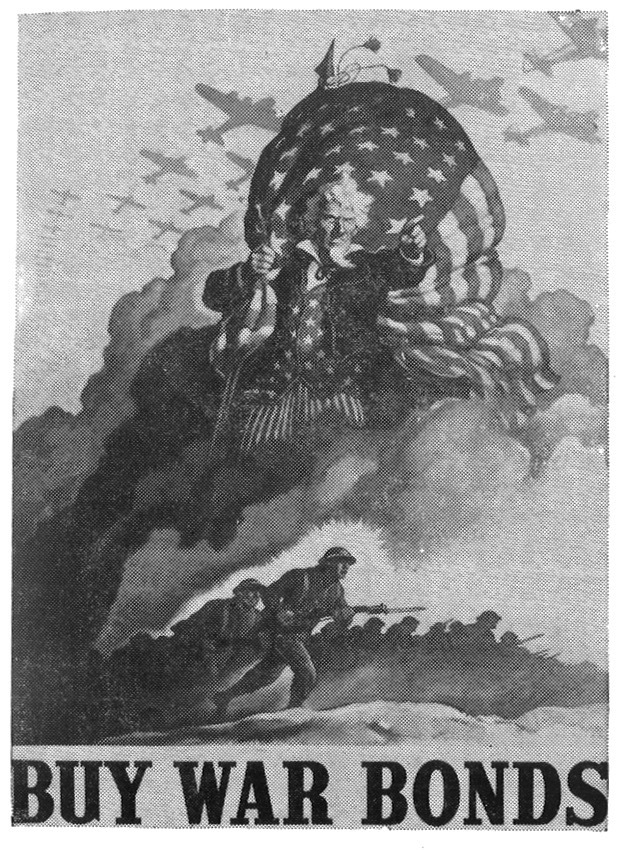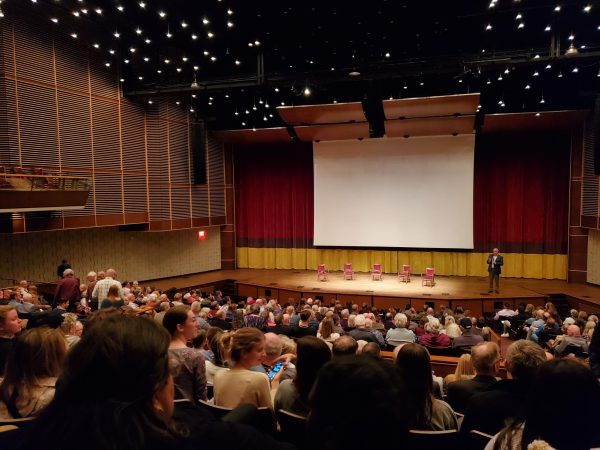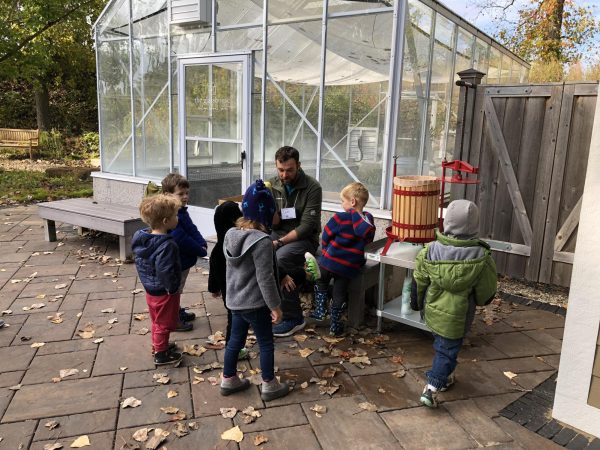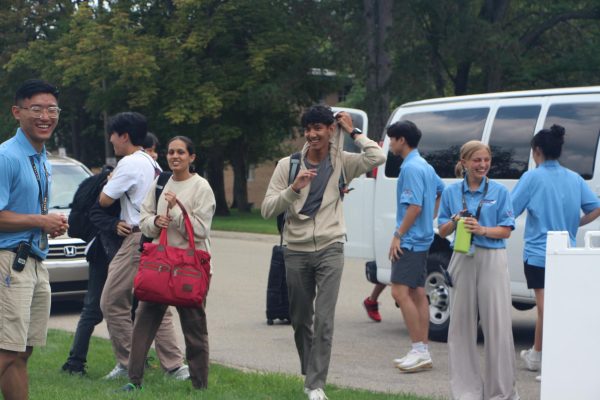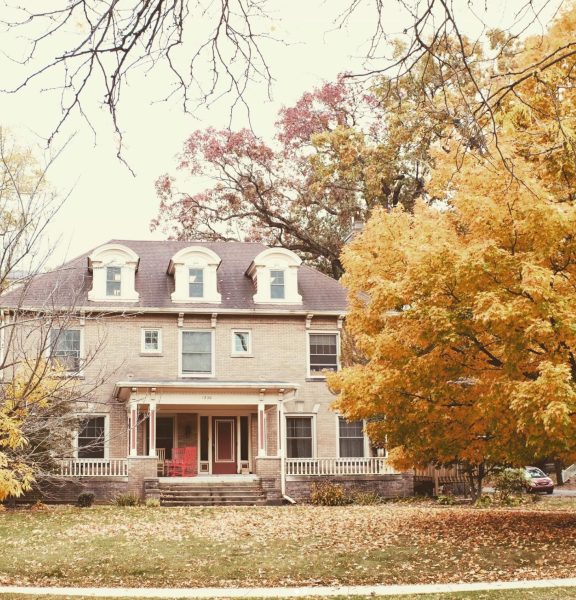Chimes coverage of historical events
War bond propoganda featured in Chimes.
Calvin College, now Calvin University, was established in 1876 — a mere 100 years after America’s founding. Since its founding, Calvin witnessed, felt and participated in some of the most important moments in American history, from D-Day to 9/11. With the transition to Calvin University and the introduction of a new Chimes logo, it seems appropriate to reflect on how the Calvin community was affected by and responded to these crucial events. The editors of Chimes decided to collect this history and make it more easily available on the Chimes website; readers can now read about select historical moments as pertaining to Calvin, as covered by Chimes.
Chimes coverage of the three events selected — WW2, the Civil Rights Movement and 9/11 — in some ways represents changes in journalism over the previous 100 years. According to Jesse Holcomb, Chimes adviser, Calvin professor and professional journalist, journalism has come to adopt an “impartial and dispassionate voice” that seeks to “telegraph its own sense of authority.” Holcomb said this is sometimes called the “voice of God.” Generally speaking, the journalistic style seems matured in the Vietnam and 9/11 articles, but, as expected, isn’t fully developed in the earlier WW2 pieces.
World War II
Chimes coverage of WW2 is rather sparse. Holcomb said that this may have something to do with how Chimes saw itself. “There were some stretches throughout Chimes’ history where it saw itself as less of a news reporting vehicle and more of a form for dialogue and conversation,” Holcomb said. Therefore, it’s possible that many major events weren’t reported on as hard news because Chimes just didn’t see itself as a newspaper.
But this doesn’t mean Chimes avoided the war altogether. The war writings, summarized, reflect a feeling that the war was part of daily life; students would leave for the war, students came back from the war, and veterans contributed greatly to campus life. Interestingly, students served in both the Dutch and American armies.
Almost every mention of the war is within the context of Calvin, with few exceptions. For example, in a recurring section called “Knights in Battle: A Department Conducted by Fran Ribbens,” Ribbens described the experiences of members of the extended Calvin community in the war. “When a year has passed with no news after a serviceman has been declared missing in action, the government assumes he is dead. So the gold star went up for Martien Loos, who had not been heard from for a year after Japan took over the Dutch East Indies shortly after Pearl Harbor. Martien came to America from The Netherlands in August, 1938, and entered Calvin in September of that year. In March, 1941, he was called to serve in the Dutch Army… after almost two years of silence, word from him reached his relatives in Grand Rapids,” wrote Ribbens.
Another soldier and former student, Henry De Wit, writing from a hut in Ireland, wrote to the then Chimes editor to thank them for their writings: “I have just received my first issue of The Calvin Chimes, the paper which I received personally while I attended Calvin. I think a little note of appreciation for the great job you are doing is strictly in order. All soldiers agree that there is nothing like news from the home front to keep up a service man’s morale.”
In addition to actual writings, Chimes also used war bond propaganda. According to communication professor Kathi Groenendyk, who teaches a course on propaganda, “Both of these are characteristic of other WWII propaganda: messages aimed to the American public, building a link between the war front and the home front, creating public support for the war.” However, she added, “Given how pervasive the WWII propaganda was, I’m not surprised to see it in Chimes.”
Greoenendyk, speaking to the ethics of the publication of the propaganda, said, “Since these Chimes war bond ads were seen in conjunction with other propaganda messages, Calvin students probably didn’t ask larger questions about the war or how to support the war effort. They were likely surrounded by such messages. If it surrounds you, you’re less likely to question… it is good that Chimes didn’t publish the propaganda that demonized the enemy and did not over-rely on fear appeals.”
Articles uploaded: “Calvin’s war contributions,” “Featuring: The Veterans,” various pieces titled “Knights in Battle: A Department Conducted by Fran Ribbens,” and the two propaganda pieces.
Civil Rights Movement
Chimes coverage of the Civil Rights movement varied based on the year, with one event in particular bringing a lot of attention to the paper: a civil rights and anti-Vietnam speaker, Dick Gregory, was told he couldn’t speak at Calvin. A Chimes article about his speech at Hope around the same time reads, “Gregory cautioned white youth about going south to work in the black movement. The movement, he said, is not playing games anymore, and it is not a social movement. If people are not completely dedicated they are no longer useful. ‘We don’t need northern white liberals anymore,’ he warned, ‘We need northern white radicals.’”
According to a Chimes article that seems to be an editorial, “The board allegedly turned down Mr Gregory because of his ‘vulgar and abrasive’ style of presentation.”
The editors were fired sometime after March 16, 1968, and with no editors, Chimes didn’t print for about a month. In that month, Martin Luther King Jr. was assassinated. The next cohort of editors covered his death, but because of the firing of editors, the coverage wasn’t as timely as it could have been, nor was it printed on the front page.
In general, the coverage tended to be more local-based, rather than national. After the 16th Street Baptist Church bombing took the lives of four African American girls in Birmingham, Alabama, more than 300 Calvin students and professors participated in a mile and a half protest march. According to a Chimes article from Sept. 27, 1963, “No doubt all Calvin students were aroused to some degree by the tragedy in Birmingham September 15.” The writer, Marlin van Elderen, noted that although over 300 participated, many students abstained from the march. Eldern says some opposed it based on “principle” while others focused on their studies or Sunday NFL football.
Chimes did not cover the assassination of Malcom X; the front page of the paper on Feb. 26, 1965, five days after his assassination, consisted of articles about a Calvin showing of Ingmar Bergman’s “The Seventh Seal,” a student reaction to a Calvin recital and the conclusion of a lecture series sponsored by student council.
During the late 1960s Chimes dedicated much more coverage to the Vietnam War.
Articles uploaded: “200 plus students applaud Gregory at Hope,” “Apartheid and Civil Rights,” “300 Calvin students join in protest march,” “Entering the promised land,” and “Apology time.”
9/11
9/11 rattled the country, including the Calvin community. Chimes covered 9/11 more intensely than WW2 or the Civil Rights Movement, with multiple articles related to the event in some way or another appearing in many issues of Chimes for the remainder of the year. Sometimes the articles were localized, but oftentimes they were more concerned with the national level. This is reflected in the front page spread of Sept. 14, 2001. There were two 9/11 headlines: the bigger one reads “Nation mourns the loss of many,” while the smaller headline reads “GR responds to crisis with prayer.”
Speaking about her civic duty as a journalist covering the event, Erin Sommers (née Erin Miller), the editor-in-chief of Chimes from 2000-2001, said, “In the Chimes office, we SPECIFICALLY felt like we had a responsibility to you, the students who would be there years after us, the ones who wouldn’t remember Sept. 11 personally.” She continued, “I won’t lie, some of it was really exhilarating… there’s a dark excitement that comes in that moment when you know you’re going out to cover something that people will want to know more about.”
Not all the coverage was straight news. Some students shared their opinions in the opinion section. Writing about America’s subsequent military conflicts, one student suggested that America was guilty of starting a religion-based war. “More people should be concerned about the ‘Christianizing of the U.S.’ America is a diverse nation that represents a variety of religions and should continue to do so,” he wrote.
However, 9/11 wasn’t the only shocking event the Calvin community faced that September. Just a few weeks after the attacks, Calvin was evacuated because of a false bomb threat. The suspect ended up not being a Calvin student, according to the Chimes article from Sept. 26, titled “Suspect arrested in campus threat.” Speaking about the threat, a Chimes editor wrote, “In four hours, Calvin’s campus went from a bustling college landscape to a deserted ghost town. Following a threatening phone call received last Thursday, the campus was evacuated, classes were cancelled, and thousands of students were sent home with family and friends.”
Sommers said, “Those two events are intricately intertwined in my memory, with the latter being much more emotional and frightening, frankly, than the Sept. 11 attacks… There was a strong sense of community when that evacuation notice was announced. I thought the college handled the whole thing really well.”
But not everything could be dedicated to 9/11. After all, Chimes covered other things too. The Friday after the attacks, the non-9/11 related headline concerned a new cohort of Calvin McGregor Fellows.
Articles uploaded: “Nation mourns the loss of many,” “Christian Pacifism,” “Broene Center offers counseling help in aftermath of terrorist attack,” “America guilty of starting a war of religion,” “Calvin evacuated after anonymous threat,” and “GR responds to crisis with prayer.”
The articles we collected have been filtered. We have not exhausted Chimes’s coverage of all these historical events.




